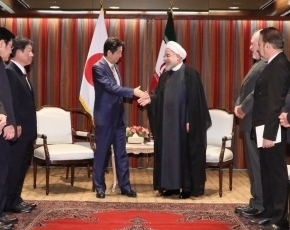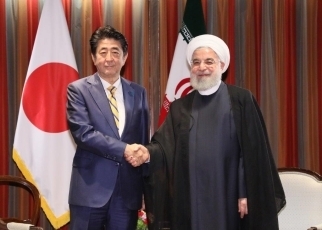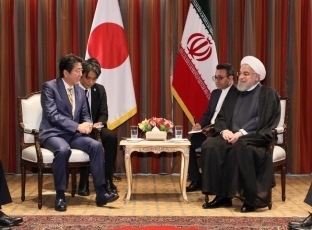Japan-Iran Relations
Japan-Iran Summit Meeting
September 24, 2019
 Japan-Iran Summit Meeting1
Photo: Cabinet Public Relations Office
Japan-Iran Summit Meeting1
Photo: Cabinet Public Relations Office
 Japan-Iran Summit Meeting2
Photo: Cabinet Public Relations Office
Japan-Iran Summit Meeting2
Photo: Cabinet Public Relations Office
 Japan-Iran Summit Meeting3
Photo: Cabinet Public Relations Office
Japan-Iran Summit Meeting3
Photo: Cabinet Public Relations Office
On September 24, commencing at around 11 a.m. (local time. 12:00a.m., September 25 Japan time) for approximately one hour, Mr. Shinzo Abe, Prime Minister of Japan, who is visiting New York to attend the United Nations General Assembly session, held a Japan-Iran Summit meeting with H.E. Dr. Hassan Rouhani, President of the Islamic Republic of Iran. The overview of the meeting is as follows.
- In light of the increasingly serious situation due to the recent attacks on the oil facilities in Saudi Arabia, the two leaders exchanged views candidly toward easing tensions and stabilizing the situation in the Middle East.
- During the discussion, Prime Minister Abe expressed strong concerns over the increasingly serious situation in the Middle East. Prime Minister Abe asked Iran to play a constructive role toward regional peace and stability, and expressed Japan’s intention to fulfill a role in easing tensions and stabilizing the situation. In response, President Rouhani stated that regional security is vital for Iran and that Iran intends to address the situation in cooperation with Japan.
- Prime Minister Abe conveyed his concerns over Iran’s successive suspension of its commitments under the Joint Comprehensive Plan of Action (JCPOA), and urged Iran to refrain from taking measures that undermine the JCPOA. In response, President Rouhani explained the position of Iran and expressed its position of opposing all weapons of mass destruction, while noting that Japan is a victim of nuclear weapons and Iran is a victim of chemical weapons.
- Prime Minister Abe stated that securing safety of navigation in the Middle East is critical for Japan, which imports over 80% of crude oil from the Middle East, and requested Iran to fulfill its responsibility as a coastal nation toward securing safety of navigation for vessels.
- The two leaders also exchanged views regarding bilateral relations, and shared the view that the two countries will continue communication at all levels, including the foreign minister level.

